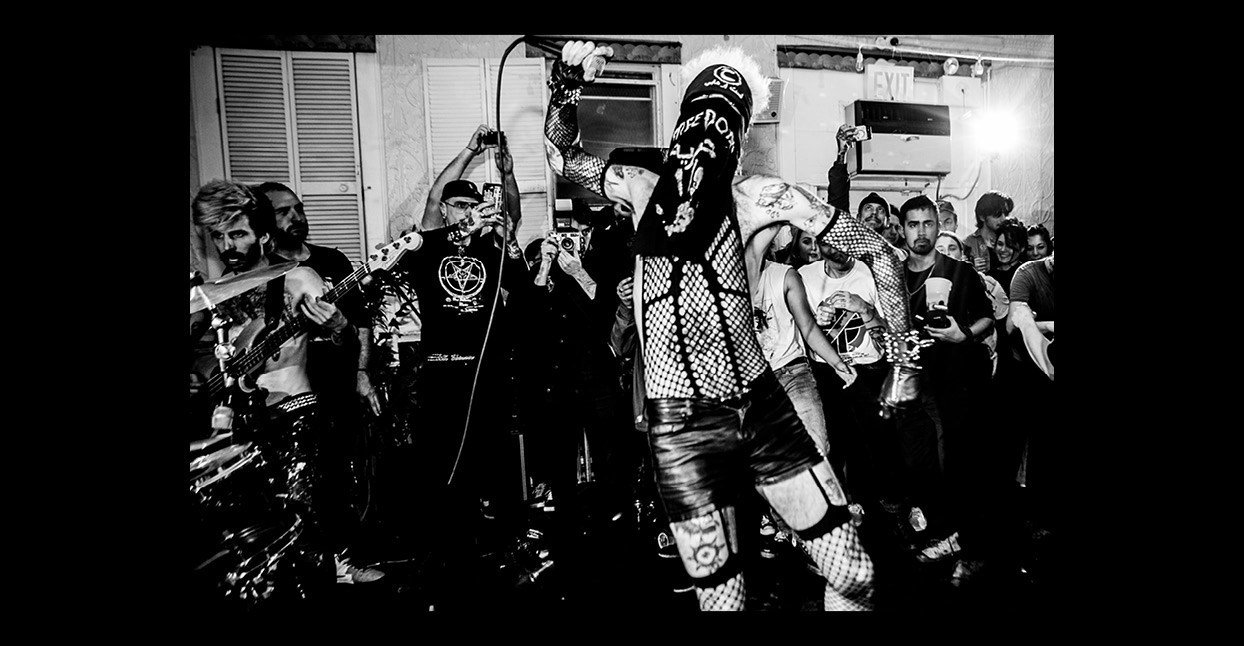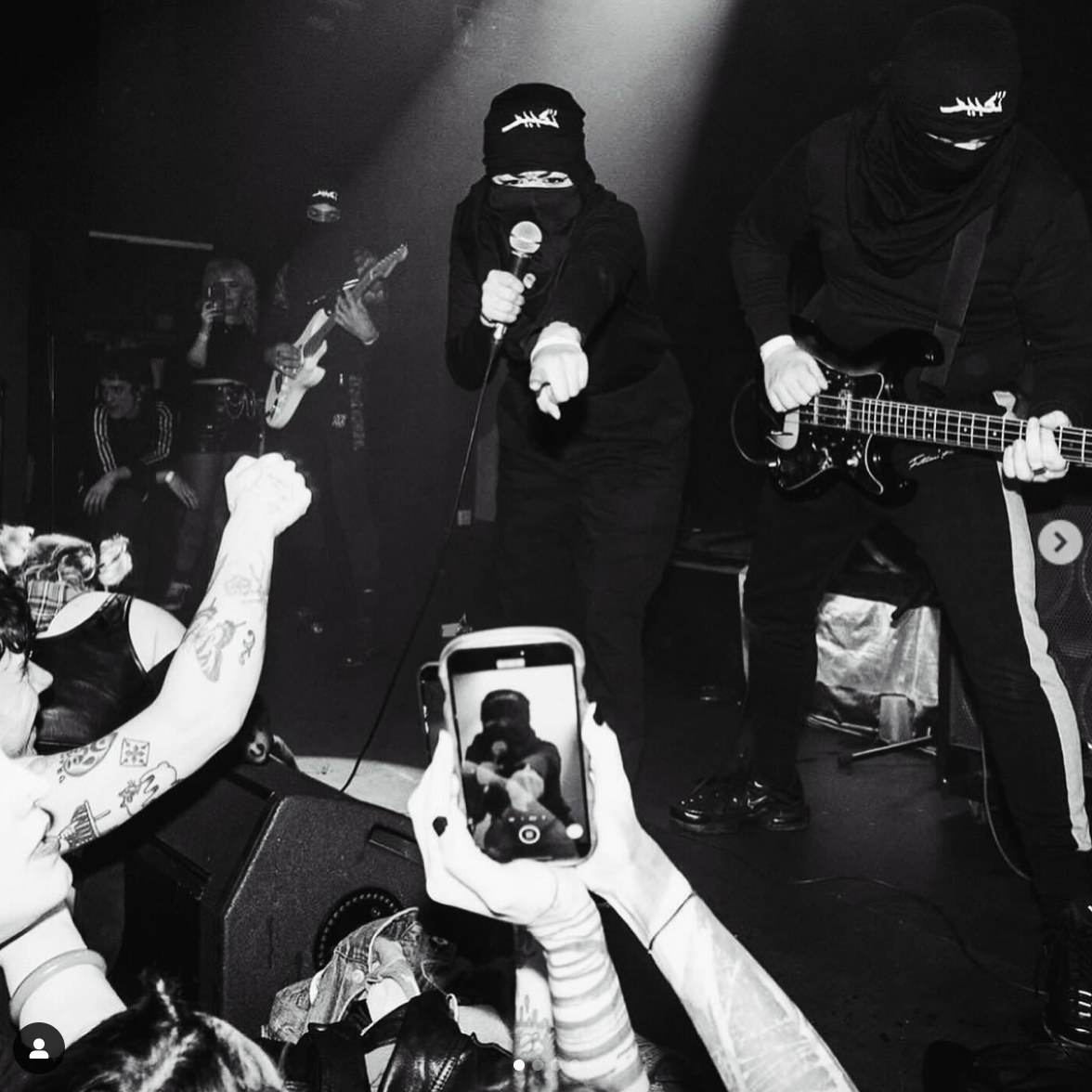Bring on the Arab Punk: Bands Haram And Taqbir Headline Philly Concert
Lauren Abunassar
Punk is coming (back) to Philly tomorrow, February 24th, as Lebanese-American New York City-based punk band Haram and Moroccan quintet Taqbir perform a concert at the First Unitarian Church. With the punk rock musical tradition trenched with raw, resistant, and even aggressive musical tonalities, how does the Arab punk rock underground appeal to and speak specifically to the diaspora?
Patti Smith called punk rock “freedom.” Joey Ramone said it was about “going against the grain.” But for Haram, it’s also about the complex aftershocks of trauma, Islamophobia, and the righteous and unfiltered anger that can come with being relegated to the fringes of society.
Band leader Nader Haram was raised in a Shia family in Yonkers, NY. “I felt like I had to change who I was to be liked,” he told Rolling Stone of growing up in a post-9/11 America. “[Punk] music was so emotional and raw and very real,” Haram continued, “and that’s really what I appreciated about it the most.”
Haram performing at Pickathon at Pendarvis Farm in Happy Valley, OR in August 2018. Photo credit: Tojo Andrianarivo.
Having released their first demo in 2015, the band has performed everywhere from Scandinavia to Australia to Canada, and even toured in Southeast Asia. Now, they are coming to Philadelphia, performing with another Arabic punk rock ensemble Taqbir.
“The music can be intense, and the message is subversive,” the event’s disclaimer reads. “This isn’t traditional Arabic music.”
Although the two bands may depart from traditional Arabic music, both are known for incorporating cultural touchstones in their work, serving as a testament to music’s ability to reconcile with culture. Nader Haram sings in a lancing and muscular Arabic, telling Pitchfork, “I wanted to bend [Arabic] to my will and work it back into my identity.” The band’s album What Do You See is also an indictment of prejudice and bias, the rest of their discography a similar exploration of the sacred and profane elements of identity.
Haram has performed live in Scandinavia, Canada, Australia, all over Southeast Asia, and more. Their performances are given in Arabic. Photo by Angela Owens.
“This is a way for me to reclaim my trauma,” Haram told Bandcamp, referencing his music’s frequent and searing indictment of the weaponization of Arab culture or the bigotry towards it. Haram himself was the subject of harassment and investigations from the Joint Terrorism Task Force and the NYPD in 2016, something he notes as both proof of bias and a nod to punk ethos.
Meanwhile, Taqbir similarly incorporates Middle Eastern iconography in their songs, their advertisements, their album covers—albeit, all with small adjustments: Their social media features a wide range of genre-bending illustrations, including the enigmatic stare of a niqab-covered woman, a wrecking ball smashing into a building in the background. They incorporate Darija (Moroccan Arabic) into their lyrics. Even the name Taqbir references the Allahu Akbar, an expression of praise and faith.
Taqbir performing live in Barcelona in 2024. Photo by Martí Bech.
The five-piece band often performs in a mix of headdresses and black jeans and sweatshirts—the ultimate amalgamation of tribute and redefinition. The quintet, composed of a bassist, a drummer, a lyricist, and two guitarists, largely prefers to remain anonymous. They withhold their names and identities and though they are open about their origins in Morocco, their current location is much harder to pin down. The band seems self-aware of this balancing act of anonymity and rebellion: “I come from a very conservative family,” a representative for the band, referred to as Aicha, told MaximumRockNRoll. “Sometimes we forget about how hard it is for some people to ‘be punk’ in other places of the world…”
Here lies a direct confrontation of punk’s particular interest in both resistance, anger, and individuality. It has become a platform for bands like Haram and Taqbir to redefine identity on their own terms, to subvert, navigate, and express it in ways scarcely afforded to the marginalized. And it’s also fed a healthy underground of similarly-inclined Taqwacore music— a punk subgenre dealing with Islam and its representation or, notably, its misrepresentation.
Philadelphia is no stranger to this scene. YallaPunk, a Philadelphia-based SWANA nonprofit founded in 2016, hosted its first interdisciplinary and admittedly “punk” festival in Philadelphia in 2017. And as Haram and Taqbir take the stage Saturday in Center City at The First Unitarian Church (2125 Chestnut Street), it seems Philly will welcome the punk community once again as yet another expression of the intersection of art, identity, and resistance.
Haram performs their song "Not a Terrorist" live in 2018. Video courtesy of Pickathon.
***
Lauren Abunassar is a Palestinian-American writer and journalist. A Media Fellow at Al Bustan, she holds an MFA from the Iowa Writers’ Workshop and an MA in journalism from NYU.



